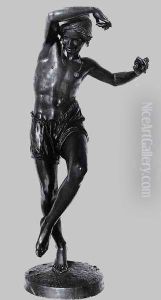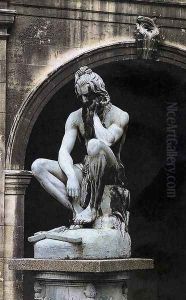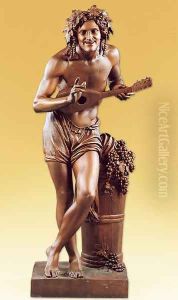Francisque-Joseph Duret Paintings
Francisque-Joseph Duret was a prominent French sculptor who emerged as a significant figure in the 19th-century art world. Born on October 19, 1804, in Paris, France, to a family of artists, Duret was exposed to the creative arts from an early age. His father, François-Joseph Duret, was a notable sculptor, which greatly influenced Francisque's future career choice. Under the tutelage of his father and later at the prestigious École des Beaux-Arts in Paris, Duret honed his skills and developed a distinctive style that would come to characterize his work.
Duret's talent was recognized early on, and he won the coveted Prix de Rome in 1823, which provided him the opportunity to study at the French Academy in Rome, the Villa Medici. His time in Italy proved to be formative, as he was exposed to classical sculpture and the works of Renaissance masters. This experience deeply influenced his aesthetic sensibilities and his approach to sculpture.
Upon returning to France, Duret established himself as a successful and sought-after sculptor. He gained recognition for his ability to blend classical traditions with the more contemporary Romantic movement that was gaining momentum in France. Duret's works often featured lively, expressive figures that were imbued with a sense of movement and emotion, characteristics that resonated with the Romantic spirit of the age.
Among his notable works are the 'Neapolitan Fisherboy Dancing the Tarantella' (1833), which showcased his mastery in capturing dynamic movement, and his contributions to the decoration of the Luxembourg Palace. Duret also created public monuments, such as the statue of French Admiral Bertrand-François Mahé de La Bourdonnais in Mauritius and various busts and statues of notable individuals of his time.
Francisque-Joseph Duret's career was marked not only by his artistic achievements but also by his contributions to the art community. He served as a professor at the École des Beaux-Arts, where he instructed and influenced the next generation of sculptors. His works were exhibited at the Salon, the official art exhibition of the Académie des Beaux-Arts in Paris, and he was awarded numerous medals and honors, including the Legion of Honour.
Duret's impact on French sculpture was significant, as he played a role in bridging classical and modern styles. His approach to sculpture was innovative for his time, and he left behind a legacy that would inspire future artists. Francisque-Joseph Duret passed away on May 26, 1865, in Paris, but his works continue to be celebrated and studied as examples of the rich artistic heritage of 19th-century France.


